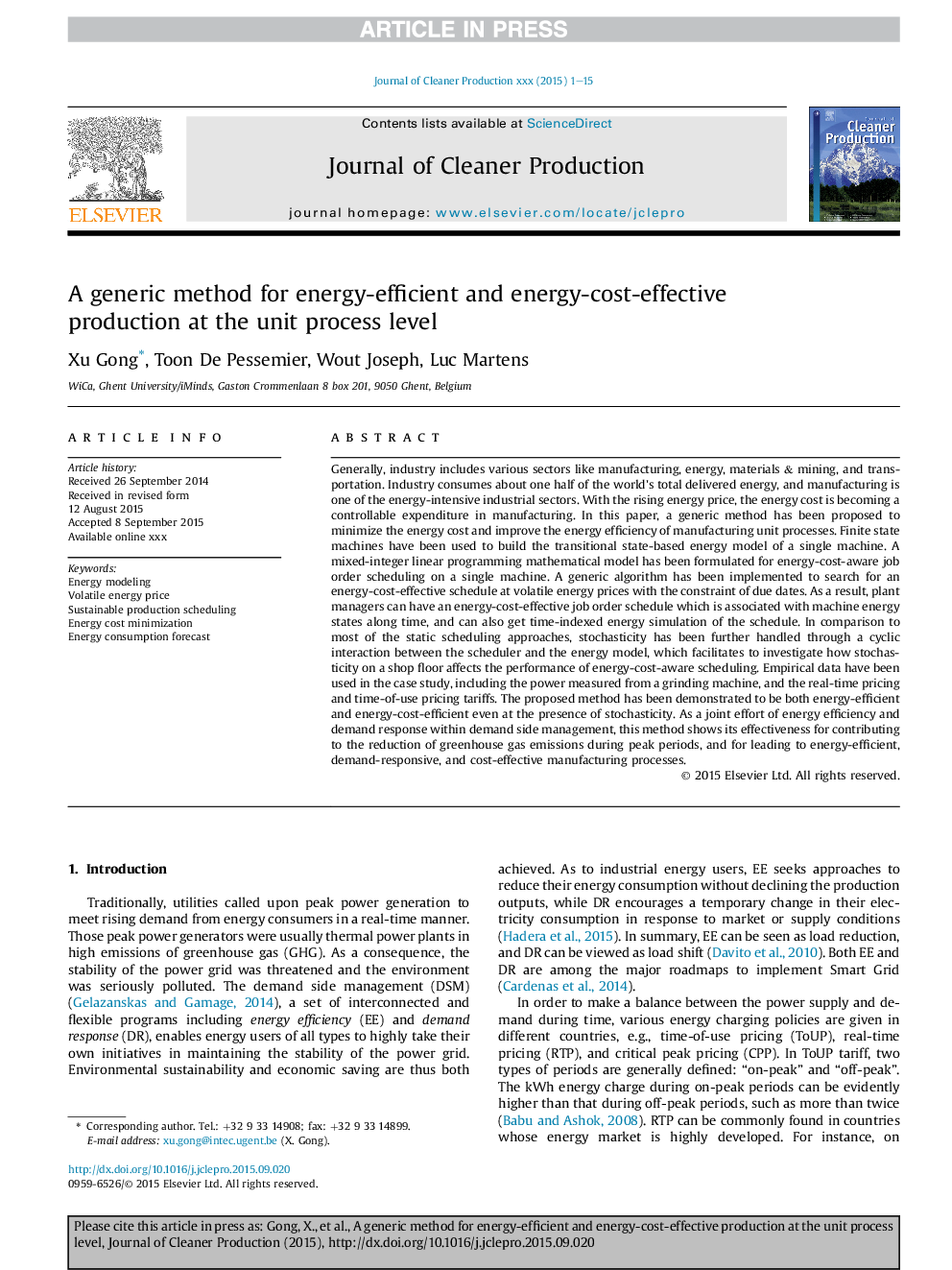| کد مقاله | کد نشریه | سال انتشار | مقاله انگلیسی | نسخه تمام متن |
|---|---|---|---|---|
| 8102927 | 1522136 | 2016 | 15 صفحه PDF | دانلود رایگان |
عنوان انگلیسی مقاله ISI
A generic method for energy-efficient and energy-cost-effective production at the unit process level
ترجمه فارسی عنوان
یک روش عمومی برای تولید انرژی با صرفه و مقرون به صرفه در سطح فرایند واحد
دانلود مقاله + سفارش ترجمه
دانلود مقاله ISI انگلیسی
رایگان برای ایرانیان
کلمات کلیدی
مدلسازی انرژی، قیمت انرژی نوسان برنامه ریزی تولید پایدار، به حداقل رساندن هزینه انرژی، پیش بینی مصرف انرژی،
ترجمه چکیده
به طور کلی، صنعت شامل بخش های مختلفی از قبیل تولید، انرژی، مواد و معدن و حمل و نقل است. صنعت حدود نیمی از کل انرژی تحویل شده جهان را مصرف می کند و تولید یکی از بخش های انرژی پر انرژی است. با افزایش قیمت انرژی، هزینه انرژی در تولید، هزینه قابل کنترل می شود. در این مقاله، یک روش عمومی برای کاهش هزینه انرژی و بهبود بهره وری انرژی فرایندهای واحد تولید پیشنهاد شده است. ماشین های دولتی محدود برای ساخت مدل انرژی انتقالی مبتنی بر حالت یک ماشین واحد استفاده شده اند. یک مدل ریاضی برنامه ریزی خطی با عدد صحیح مخلوط شده برای برنامه ریزی سفارش هزینه های انرژی صرفه جویی در یک ماشین واحد طراحی شده است. یک الگوریتم عمومی برای جستجو برای یک برنامه صرفه جویی در مصرف انرژی در قیمت های متغیر انرژی با محدودیت زمان های به کار گرفته شده اجرا شده است. به عنوان یک نتیجه، مدیران کارخانه می توانند یک برنامه سفارش کار با صرفهجویی در مصرف انرژی داشته باشند که با وضعیت انرژی ماشین در طول زمان همراه است و همچنین می تواند شبیه سازی انرژی زمان بندی شده برنامه را دریافت کند. در مقایسه با بسیاری از رویکردهای زمانبندی استاتیک، تصادف بیشتر از طریق تعامل چرخه ای بین زمانبند و مدل انرژی انجام شده است، که باعث می شود تا بررسی شود که چگونه تصادف در یک طبقه ی فروشگاه بر عملکرد برنامه ریزی هزینه های انرژی تاثیر می گذارد. داده های تجربی در مطالعه موردی، از جمله قدرت اندازه گیری شده از یک ماشین سنگ زنی، و تعرفه های قیمت گذاری در زمان واقعی و قیمت گذاری در زمان واقعی استفاده شده است. روش پیشنهادی نشان داده شده است که هر دو صرفه جویی در مصرف انرژی و صرفه جویی در مصرف انرژی حتی در صورت تصادف بودن. به عنوان یک تلاش مشترک از کارآیی انرژی و پاسخ تقاضا در مدیریت تقاضا، این روش اثربخشی آن را برای کمک به کاهش انتشار گازهای گلخانه ای در طول دوره های اوج و همچنین برای تولید انرژی با کارایی، پاسخگویی به مصرف و تولید مقرون به صرفه فرآیندهای
موضوعات مرتبط
مهندسی و علوم پایه
مهندسی انرژی
انرژی های تجدید پذیر، توسعه پایدار و محیط زیست
چکیده انگلیسی
Generally, industry includes various sectors like manufacturing, energy, materials & mining, and transportation. Industry consumes about one half of the world's total delivered energy, and manufacturing is one of the energy-intensive industrial sectors. With the rising energy price, the energy cost is becoming a controllable expenditure in manufacturing. In this paper, a generic method has been proposed to minimize the energy cost and improve the energy efficiency of manufacturing unit processes. Finite state machines have been used to build the transitional state-based energy model of a single machine. A mixed-integer linear programming mathematical model has been formulated for energy-cost-aware job order scheduling on a single machine. A generic algorithm has been implemented to search for an energy-cost-effective schedule at volatile energy prices with the constraint of due dates. As a result, plant managers can have an energy-cost-effective job order schedule which is associated with machine energy states along time, and can also get time-indexed energy simulation of the schedule. In comparison to most of the static scheduling approaches, stochasticity has been further handled through a cyclic interaction between the scheduler and the energy model, which facilitates to investigate how stochasticity on a shop floor affects the performance of energy-cost-aware scheduling. Empirical data have been used in the case study, including the power measured from a grinding machine, and the real-time pricing and time-of-use pricing tariffs. The proposed method has been demonstrated to be both energy-efficient and energy-cost-efficient even at the presence of stochasticity. As a joint effort of energy efficiency and demand response within demand side management, this method shows its effectiveness for contributing to the reduction of greenhouse gas emissions during peak periods, and for leading to energy-efficient, demand-responsive, and cost-effective manufacturing processes.
ناشر
Database: Elsevier - ScienceDirect (ساینس دایرکت)
Journal: Journal of Cleaner Production - Volume 113, 1 February 2016, Pages 508-522
Journal: Journal of Cleaner Production - Volume 113, 1 February 2016, Pages 508-522
نویسندگان
Xu Gong, Toon De Pessemier, Wout Joseph, Luc Martens,
